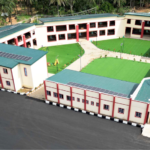- Home
- Features
- Startup Zone
- Projects
- Policies
- Shop
- Policies
- Projects
- Startup Zone
- Country Spotlight
- Analysis
- Tech
- Policies
- Projects
- Startup Zone
- Country Spotlight
- Analysis
- More
- Beyond the Kalashnikov: Africa’s Shift Toward Technology-Driven Warfare
- Afrail Express: Uniting a Continent on Rails
- AFRICA’S ENERGY CORRIDORS: CONNECTING POWER, PEOPLE, AND PROSPERITY
- Startup Lions Campus: Empowering Kenya’s Digital Generation
- L’Art de Vivre’s Le Paradis de Mahdia: Tunisia’s Model for Sustainable Luxury
- The Lobito Corridor: Rewiring Africa’s Trade Arteries Through Strategic Infrastructure
- AFRICA’S GREEN ENERGY TRANSITION: A BEACON OF HOPE FOR CLIMATE ACTION
- Dangote Refinery: Showcasing Africa’s Project Success Story
- AFRICA GREEN ECONOMY: ALL YOU NEED TO KNOW
- The Most Important Amicus Brief in the History of the World
- The Rise of Indigenous UAVs: Africa’s Drone Capabilities in Warfare and Surveillance
- AFRICA’S LARGEST OIL PRODUCERS: A COMPREHENSIVE OVERVIEW
- Beyond the Kalashnikov: Africa’s Shift Toward Technology-Driven Warfare
- Afrail Express: Uniting a Continent on Rails
- AFRICA’S ENERGY CORRIDORS: CONNECTING POWER, PEOPLE, AND PROSPERITY
- Startup Lions Campus: Empowering Kenya’s Digital Generation
- L’Art de Vivre’s Le Paradis de Mahdia: Tunisia’s Model for Sustainable Luxury
- The Lobito Corridor: Rewiring Africa’s Trade Arteries Through Strategic Infrastructure
- AFRICA’S GREEN ENERGY TRANSITION: A BEACON OF HOPE FOR CLIMATE ACTION
- Dangote Refinery: Showcasing Africa’s Project Success Story
- AFRICA GREEN ECONOMY: ALL YOU NEED TO KNOW
- The Most Important Amicus Brief in the History of the World
- The Rise of Indigenous UAVs: Africa’s Drone Capabilities in Warfare and Surveillance
- AFRICA’S LARGEST OIL PRODUCERS: A COMPREHENSIVE OVERVIEW
- Beyond the Kalashnikov: Africa’s Shift Toward Technology-Driven Warfare
- Afrail Express: Uniting a Continent on Rails
- AFRICA’S ENERGY CORRIDORS: CONNECTING POWER, PEOPLE, AND PROSPERITY
- Startup Lions Campus: Empowering Kenya’s Digital Generation
- L’Art de Vivre’s Le Paradis de Mahdia: Tunisia’s Model for Sustainable Luxury
- The Lobito Corridor: Rewiring Africa’s Trade Arteries Through Strategic Infrastructure
- Startup Zone
Top Insights
Blockchain for Energy: Can Africa Lead the Charge?

The energy sector in Africa is at a pivotal crossroads. With a population of 1.3 billion and a combined GDP of $3.4 trillion, the continent has immense potential to become a global leader in energy innovation. Among the various technologies that hold promise for this transformation, blockchain stands out as an exceptionally powerful tool. Its potential for revolutionising energy access, promoting financial inclusion, and driving sustainable practices is unparalleled. By leveraging blockchain technology, African nations can create secure and transparent energy trading systems, empower small energy consumers, and foster the growth of local economies.
The Energy Landscape in Africa: Challenges and Opportunities
Current Energy Access Issues
In rural Africa, energy challenges represent formidable obstacles to development and progress. Many remote communities lack reliable access to electricity, which hampers essential services, education, and economic opportunities. According to the International Energy Agency (IEA), around 600 million people in Africa still lack access to electricity, representing a significant barrier to the continent’s development and industrialisation.
READ ALSO: The Digital Backbone of Smart Cities: Lagos, Kigali, Nairobi
Traditional energy systems in these regions are often centralised and dependent on long-distance transmission lines that are costly to maintain and expand into underserved areas. Moreover, the existing power grids are frequently plagued by inefficiencies, service interruptions, and a lack of accountability, which perpetuate a cycle of disempowerment for local communities.
The Promise of Blockchain Technology
Blockchain technology emerges as a potential game-changer in addressing these energy challenges. By offering decentralised and transparent solutions, blockchain has the ability to foster energy democratisation, allowing local communities to produce, share, and consume renewable energy sustainably. Among the promising renewable energy sources, solar energy stands out as a viable alternative for electricity generation in Africa’s sun-rich regions.
By integrating blockchain with solar energy solutions, rural communities can unlock new avenues for power access, reduce reliance on fossil fuels, and pave the way for a brighter and more sustainable future. This transformation can bring greater transparency, accessibility, and empowerment to African economies, ultimately improving systems and processes across the energy spectrum.
How Blockchain Can Revolutionise Energy Access
Decentralisation and Energy Democratisation
One of the most significant benefits of blockchain is its ability to decentralise energy production and distribution. In a conventional energy landscape, providers are often monopolistic entities with little incentive to invest in underserved areas. However, with blockchain’s decentralised nature, energy production can occur at the community level, allowing households and local entities to become energy producers.
Members of rural communities can tap into renewable resources such as solar or wind, generating energy for their consumption or selling excess energy to their neighbours. This shift not only improves energy access but also creates economic opportunities by providing communities with a new revenue stream.
The Role of Software Development
Software development plays a crucial role in building the platforms and smart contracts that facilitate secure and transparent energy transactions within the blockchain network. By creating user-friendly applications and interfaces for energy management, software developers can enhance community engagement and simplify participation in energy trading efforts.
As blockchain technology evolves, developers must focus on addressing challenges related to scalability, interoperability, and data privacy. The advancement of innovative software solutions will play a significant role in shaping the future of decentralised energy access in Africa.
Peer-to-Peer Energy Trading on the Blockchain
Peer-to-peer energy trading is a groundbreaking concept that empowers individuals and communities to control their energy consumption and production. By enabling direct energy transactions among small producers and consumers, blockchain facilitates a more inclusive energy economy.
In such a trading system, homeowners and businesses equipped with renewable energy installations can sell excess energy generated from solar panels to their neighbours. The execution of these transactions occurs through smart contracts—self-executing agreements that enforce the terms upon predefined conditions being met. The result is a decentralised, transparent market that fosters trust among participants.
The Benefits of Peer-to-Peer Energy Trading
1. Financial Incentives: Homeowners generating excess energy can earn additional income by selling it to their neighbours or nearby businesses that require supplementary power, which helps recoup initial investments in renewable energy installations.
2. Cost Reduction: Energy consumers can access locally produced renewable energy, often at lower costs than purchasing from the grid, benefiting from a reduced energy expenditure.
3. Grid Resilience: Decentralised energy trading enhances grid resilience by reducing strain on centralised power systems and minimising transmission losses, contributing to more stable energy supplies.
A robust software development framework is essential to ensuring a successful peer-to-peer energy trading system. Developers will need to create smart contracts that accurately record energy transactions while ensuring data privacy and security. User-friendly applications must also be designed to make it easy for community members to participate in energy trading.
Microgrids and Smart Contracts: Empowering Rural Communities
Microgrids are localised energy systems that can operate independently or in conjunction with larger power grids. They have emerged as powerful solutions for rural communities in Africa, providing reliable and sustainable energy access without relying on centralised electricity networks.
By integrating smart contracts on the blockchain, microgrids can facilitate real-time energy trading and better energy management. Residents generating energy can sell excess electricity to neighbours, effectively creating a community-driven energy ecosystem.
The Role of Software Development in Microgrid Systems
Software developers are responsible for creating and implementing the digital infrastructure necessary for microgrids and smart contracts to function effectively. This includes integrating energy metering systems, data verification processes, and automated transaction functionalities on the blockchain. User-friendly interfaces and mobile applications must also be developed to empower community members to monitor their energy production and consumption.
Furthermore, developers must also focus on optimising the efficiency and scalability of microgrids. This ensures that these systems can accommodate the increasing energy demands of growing rural populations, ultimately delivering dependable energy access.
Advantages of Solar Energy in Africa
Abundance of Solar Resources
Africa is uniquely positioned to harness the power of solar energy, boasting some of the world’s most abundant sunshine resources. With vast stretches of land and consistent sunlight throughout the year, solar power offers a sustainable and scalable alternative to meet the energy demands of rural communities.
Harnessing these solar resources presents a range of opportunities, particularly in renewable energy initiatives. Software development is crucial in optimising solar energy generation, storage, and distribution. Intelligent monitoring and control systems can be developed to track the performance of solar panels, while data analytics tools can streamline energy management strategies.
Environmental Benefits and Sustainability
The adoption of solar energy comes with significant environmental benefits, notably its contribution to sustainability in the energy sector. Solar energy generation produces no greenhouse gas emissions, thereby reducing the carbon footprint associated with traditional fossil fuel power sources.
As solar installations become more prevalent, their integration into existing energy infrastructures will drive the establishment of cleaner and more sustainable energy systems. Software developers will play an essential role in designing solutions that enhance the environmental credentials of solar energy technologies.
Economic Advantages for Rural Communities
The widespread adoption of solar energy in rural areas provides not only environmental benefits but also substantial economic advantages. Key economic benefits include:
1. Cost Savings: By providing an affordable and renewable source of electricity, solar energy systems minimise reliance on costly imported fossil fuels, resulting in lower electricity bills for households and businesses.
2. Job Creation: The deployment of solar infrastructure creates job opportunities at various levels, from installation and maintenance to project management and software development.
3. Entrepreneurship Opportunities: Access to electricity enables small businesses to flourish, empowering local entrepreneurs to invest in essential services, such as food processing and agribusiness.
By strategically implementing solar energy solutions and leveraging software development, rural communities can experience enhanced economic growth, reduced energy costs, and improved overall quality of life.
Overcoming Infrastructure Limitations with Solar Solutions
Infrastructure Challenges in Africa
Infrastructure limitations present formidable barriers to economic growth throughout Africa. Many communities lack reliable electricity due to the absence of robust grid infrastructure. Additionally, limited road networks and difficult terrain complicate the transportation of fuels required for traditional power generation methods.
How Solar Solutions Address Infrastructure Challenges
Solar energy systems can be implemented in off-grid or microgrid configurations, providing localised power generation independent of traditional grid networks. Solar installations offer rapid deployment capabilities, ensuring that energy access can be established quickly in rural communities.
The modular and scalable nature of solar solutions allows communities to customise installations based on their specific energy needs and available financial resources. This flexibility empowers communities to take charge of their energy requirements, strengthening energy resilience and reducing dependence on external power sources.
Job Creation in Rural Areas Through Solar Energy Adoption
Energy Sector Job Opportunities
The shift toward solar energy in rural areas presents significant opportunities for job creation, as various positions related to the installation, maintenance, and operation of solar power systems become available. Job creation in the energy sector can stimulate local economies, empowering communities to thrive and grow.
Driving Demand for Software Development
As solar energy systems expand, there will be an increasing need for skilled software developers to design and implement smart energy management solutions. The growth of the solar sector will drive demand for innovative applications that enhance the efficiency and usability of renewable energy systems.
Job Creation Impacting Local Economies
The economic advantages of solar energy adoption extend beyond the immediate job opportunities generated by installations. With reliable energy access, local businesses can flourish, and expanded agricultural and industrial activities will contribute to a more vibrant local economy. This growth leads to job creation across various sectors, positively impacting the overall sustainability and resilience of rural areas.
Solar-Powered Agricultural Development and Water Pumping
Enhancing Agricultural Productivity
Solar-powered irrigation systems have emerged as sustainable solutions to enhance agricultural productivity in Africa. By harnessing sunlight to power irrigation methods, farmers can significantly increase crop yields and food security.
Solar-Powered Water Pumping Systems
Solar-powered water pumping systems are becoming increasingly popular, particularly in water-scarce regions. These systems provide reliable access to clean drinking water and irrigation resources, helping mitigate the water crisis facing many rural communities.
Role of Software Development in Agriculture
Software development is vital in optimising solar-powered agricultural systems. Solutions that automate irrigation schedules and remotely monitor water levels improve efficiency and resource management, ultimately leading to better agricultural outcomes. As agriculture relies heavily on effective water management, software-driven innovations can bolster productivity while minimising waste.
Enhancing Educational Opportunities with Reliable Electricity
Transforming Education through Electrification
Reliable access to electricity transforms educational opportunities in Africa. Schools can utilise electricity to power technology and modern learning resources, helping students prepare for the future by gaining digital skills.
Beyond the Classroom: Community Learning Hubs
Electrified schools can also serve as community hubs, promoting skill-sharing and training programs that uplift local communities. Investment in education driven by reliable electricity access fosters a culture of continuous learning and empowers individuals to pursue higher education and skill development.
Software Development in Education
Software development facilitates the creation of educational apps, e-learning platforms, and interactive tools tailored to diverse learning needs. These innovations can help bridge educational gaps, improve learning outcomes, and prepare students for thriving in a tech-driven world.
Case Studies and Success Stories
Solar-Powered Microgrid Projects in African Rural Communities
One notable example of success is the Microgrids for Rural Electrification project in Kenya. Innovative software development increased operational efficiency through smart monitoring and control systems, optimising energy distribution in remote villages.
In Tanzania, the Solar Nano Grids project leverages smart meters and remote monitoring software, allowing microgrid operators to better understand energy consumption patterns, thereby improving energy planning and financial viability.
Empowering Women Entrepreneurs with Solar Energy
Initiatives like Solar Sister in Tanzania empower women entrepreneurs by providing them with clean energy products and enabling small businesses. Utilising solar energy for business operations has proven effective in uplifting women economically and socially.
Another example is the WIRED initiative in Rwanda, focusing on women’s involvement in the installation and maintenance of solar energy systems, ultimately shaping their roles as energy leaders in their communities.
Renewable Energy Initiatives in Collaboration with NGOs
Collaborative efforts between NGOs and local communities in Kenya have resulted in solar-powered microgrid systems that enhance energy access. These initiatives lead to educational and economic improvements, showcasing the power of community-focused solutions.
Furthermore, successful partnerships in Tanzania have resulted in solar water pumping systems that ensure reliable access to clean water, ultimately transforming lives and driving community development.
Government-Led Solar Energy Projects and Policies
Morocco has made significant strides in renewable energy through government-led initiatives, exemplified by the Noor Solar Power Complex. By creating an investment-friendly policy environment, Morocco has harnessed solar resources and established a commitment to clean energy.
Rwanda’s Electricity Access Rollout program is another prime example of success. By leveraging renewable sources such as solar power, the country enhances electricity access, driving socio-economic growth and empowering communities.
The Impact on Healthcare Facilities and Telemedicine
Improving Healthcare Accessibility
Solar energy has a transformative impact on healthcare facilities, ensuring reliable energy access to power essential medical equipment. These solar-powered centres enhance service delivery and treatment outcomes, even in areas prone to power disruptions.
Advancing Telemedicine Initiatives
Telemedicine, enabled by solar power, bridges the gap between healthcare providers and remote patients. With reliable energy and connectivity, healthcare providers can offer real-time consultations, improving health outcomes and saving lives.
Challenges and Future Outlook
Addressing Financing and Investment Hurdles
Despite the potential of solar energy, financing and investment bottlenecks remain significant challenges. Innovative solutions like green financing mechanisms and collaborative public-private partnerships have emerged as effective strategies for overcoming these hurdles.
Overcoming Regulatory and Policy Barriers
Countries such as Ghana and Morocco have recognised the importance of creating favourable regulatory environments for renewable energy projects. By developing supportive legal frameworks, these nations have attracted investments in solar energy, enhancing energy access.
Ensuring Technology Accessibility and Literacy
Efforts to bridge the digital divide and promote technology literacy among rural communities are essential. Initiatives like Solar Sisters and the African Renewable Energy Fund prioritise technology training and capacity building, empowering local populations to engage with solar solutions.
Scalability and Integration of Solar Blockchain Solutions
For blockchain-powered solar energy solutions to succeed, scalability and seamless integration with existing energy infrastructures are crucial. Addressing challenges related to software development, harmonising regulatory frameworks, and ensuring interoperability will be critical.
The Future Potential of Blockchain-Powered Solar Energy in Africa
As Africa works to address its energy challenges, blockchain technology can play a vital role in expanding access to reliable electricity and fostering sustainable growth. By leveraging innovative software development, we can expect to see increasingly sophisticated blockchain solutions that enhance energy management.
The convergence of solar energy and blockchain technology represents an exciting frontier for transformational change. It holds the potential to empower local communities, drive economic growth, and create a more sustainable energy future for Africa.
Bitcoin and blockchain technology represent not only a new era for the global digital economy but also a unique opportunity for Africa to leap into the forefront of renewable energy innovation. By harnessing its abundant solar resources and integrating blockchain solutions, Africa can enhance energy access, promote financial inclusion, and foster sustainable development.
As we stand at the crossroads of technological advancement and resource utilisation, African nations have every reason to embrace blockchain for energy. Through collaboration, innovation, and commitment, Africa can lead the charge in redefining its energy landscape and unlocking a brighter, more sustainable future for its people. The aspiration for energy independence and economic empowerment is within reach—Africa just needs to leap.
Recent Posts
Related Articles
Women in South African Construction: Progress and the Road to Equality Ahead of Women’s Day 2025
As South Africa approaches National Women’s Day on August 9, 2025, there’s...
Byadmag_adminJune 12, 2025Water Works: The Infrastructure Behind Africa’s Urban Thirst
Africa’s cities are facing a growing water crisis, with millions of people...
Byadmag_adminJune 12, 2025Urban Housing at Scale: Can Africa Build 100 Million Affordable Homes by 2035?
Africa faces an unprecedented urban housing challenge driven by rapid population growth,...
Byadmag_adminJune 12, 2025The Best Performing Currencies in Africa
The African continent is home to 54 countries, each with its own...
Byadmag_adminJune 12, 2025













